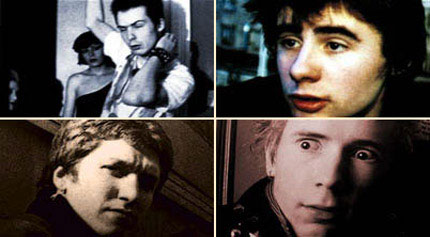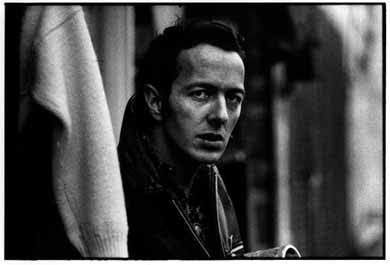
Esta fue la segunda película que Julien Temple ha hecho sobre los Sex pistols. Basando el titulo de su documental en el titular de un tabloide británico del Daily Mirror, Temple traza el lugar, la decadencia y la caída de esta banda de rock , desde sus humildes comienzos en el Sheperds bush hasta su desintegración en el Winterland Ballroom de San Francisco. Los pistols encontraron a través de esta película una especie de oportunidad para contar su versión de la historia sobre todo a través de entrevistas que se les hicieron en donde fueron libres de compartir sus testimonios.

Temple presenta a los Sex pistols en todo su esplendor, haciendo obscenidades al aire, escupiendo a periodistas, rebelándose de las formas mas atroces rompiendo con la monotonía y la hipocresía de 1970 en Inglaterra. Cad acto vandálico se va sintiendo como la formación de una nueva escuela, la sociedad y la fura del punk rock británico en su momento de mayor impacto.
Varias teorías y mitos han surgido alrededor de esta banda , como que nunca fueron una banda de rock sino mas bien una pieza de arte conceptual. Para Jhonny Rotten , vocalista de la banda el punk fue la expresión orgánica espontánea de la clase trabajadora.

The filth and the fury se conforma de un sin fin de materiales encontrados, programas de la BBC hasta dibujos animados de superhéroes, generando una estética que va de acuerdo con el punk. Al principio del documental Temple continua regresando al caos sociocultural de aquella época, como una fuente importante de impulso al surgimiento de bandas como los Sex Pistols.
Una figura importante a parte de la banda por supuesto es quien fue su manager Malcolm McLaren, quien tuvo una presencia perturbarte en la banda pero al mismo tiempo vital, tan vital que sin el no hubieran existido. En la primera película The great rock and roll Swindle el manager tuvo su presencia, mientras que en esta segunda e reciente su ausencia. A pesar de esto la construcción y factura es cuidadosa, un gran acierto para la historia, logrando plasmar su imagen iconografía como banda de rock, corriendo riesgos como terminar pareciendo una pieza de propagada, el documental termina por ser elocuente, entretenido y algunos momentos conmovedor.

Entrevista con Julien Temple
By Joshua Klein April 12, 2000
Why return to The Sex Pistols now?

Julien Temple: Well, there are a lot of reasons. One, I guess we had spoken about it for a while—the band and myself—because we always knew there was interesting footage that hadn't been used. I suppose a certain amount [of incentive] is just having the time to do it. It's a strange project to do, in a sense, because it's very mad to make a film about the same subject in a way. Particularly about a rock band; I don't think I would do that about any other band. But you weigh those things, and things you're not meant to do are often the best things to do, you know? I always felt there was kind of a millennial aspect to The Sex Pistols. I think [critic] Greil Marcus and other people have picked up on that. It does seem a particularly good time to do it, partly because no one has actually gone further than The Sex Pistols, I don't think, in that cultural music arena. They still challenge people. I think in many ways—and we found this out when we tested the film in England—a lot of the younger kids thought it was a fictional piece, beyond Spinal Tap. They thought it was actors playing the part of deranged rock stars, or whatever they thought they were. And I think in that context, when a generation of kids is that ignorant of their recent history, it does a good job of showing what the Pistols were standing for. It's current and it's in the air, partly because I think nothing contemporary is as extreme or as strongly stated as what The Sex Pistols were able to do in their time, in the '70s. I think the reason to [make the film] is that their ideas are still alive: the defense of the right to be an individual, and questioning everything you read, and questioning all the information that's bombarded increasingly at you. It's more important than ever, with the opening of the floodgates of information from every corner, to stand up and say that the most important thing about us all is the fact that we're all individuals who can think for ourselves. It's a very defiant cry that's worth paying more and more attention to.
O: Speaking of countering misinformation, in many ways The Filth And the Fury is an answer to The Great Rock 'n' Roll Swindle, which you also directed. The films present very different ideas of what The Sex Pistols were about.
JT: Yeah, but I think the sort of linear concept of one thing answering the other is a bit simplistic. I think that with any event of this kind, involving the kind of characters around them and the effect they had on the world around them, there are many versions of the truth. I wouldn't say that it's a kind of straightforward rebuttal of ideas in The Rock 'n' Roll Swindle. That was made at a very different time with a very different purpose: specifically in the immediate aftermath of that band at that time, to display the aura of pop divinity as fake. You know, kids were idolizing them in the same unthinking way they idolized The Bay City Rollers or Rod Stewart in England. And The Rock 'n' Roll Swindle was meant to be kind of a mischievous joke taking the piss out of this band that was supposed to be the saviors of the world at that point for a lot of kids. I think it was an important thing to do, questioning the belief in things that challenged you to question the belief of things in the first place.

O: Was [former Sex Pistols manager] Malcolm McLaren involved at all with the new film?
JT: In this film, no. He was involved to the extent that we used taped interviews, but it was very much the band's version of what it was like to go through that process, which in a sense is like a firestorm they went through. It's meant to be a lot more of a human film than the kind of Godardian Rock 'n' Roll Swindle. It's more about the reality as it appeared to the people who were actually in that band. I see it more as a complementary addition to the whole canon of Sex Pistols-obsessional material, in a way. I think Greil Marcus' take on it [as seen in his book Lipstick Traces: A Secret History Of The 20th Century] and Jon Savage's take [as seen in England's Dreaming: Anarchy, Sex Pistols, Punk Rock And Beyond], they're all valid. Malcolm's take is valid. But this is the band's take.
O: What's unique about The Filth And The Fury is that it does more than those other works to humanize the band members. You have people who idolize Sid Vicious, but he's really a tragic figure. I found it remarkable in your film when John Lydon broke down talking about his death.
JT: Well, yeah. So did I!
O: He doesn't usually break character like that. I'm sure you'd never seen that happen before.
JT: No, it was very surprising to me. It was an awkward moment, as well, because I don't think John usually sees himself as coming across like that. It was a strange moment, but I think that moment tells you a huge amount about things that a lot of words couldn't say.
O: You obviously went through a lot of archival footage to assemble The Filth And The Fury. What didn't make it into the film?
JT: The main stuff that isn't in the film is just more live footage from the same gig. It's not as though there were other gigs that we unearthed that we didn't use. There were more songs from the gigs we did use. I don't know, there may well be some more stuff out there, but we were quite thorough in trying to track down even stock that Adam Ant had shot when his band played with The Sex Pistols. Anything that was relevant we tried to find and look at. There's nothing inherently shocking, other than more stuff from the same sources.
O: Did the band members have any say over what was included or excluded?
JT: It was always a joint project between myself and the band, so I was aware of trying to convey, in my own way, their side of the story and their feelings. So I think that once that was established, I was quite free to do what I wanted, and I did. They never made me change anything, actually.
O: When you were making The Filth And The Fury, did you intentionally approach it like a video director might—with more flash—or did you consider making it more straightforward, like a conventional documentary, with less flash and less fancy editing?
JT: Well, I'm not a documentary maker, per se. I see this film as a movie, not as a documentary in a... I don't know what the conventions are, really. It's certainly not a television-styled documentary. The editing style goes way back to when we used to make films before the Pistols. When they were banned, we would film stuff off television and re-edit TV shows, chop it up, and show films before their gigs. So that cut-up style was very endemic to the ideas of the Pistols, I think. I wanted to get a lot of information across in a short time, as well, so I wanted to not have a linear approach to it. It was very improvised. We were actually one of the first people to have a video machine in the U.K., where you could tape, because we were trying to tape their TV performances, some of which are in the film.
O: How would you say the attitude toward The Sex Pistols has changed throughout the U.K. over the last 20 years?
JT: I think 20 years is a long time, so there have been changes throughout that time. There was a sense of them that ties into that group not realizing they were a real band, that no one could be that way because the story is pretty outrageous. But I think what happened in the last few years is that there are a lot of bands coming out of the U.K. now where the only real models are The Sex Pistols, not people like the Stones or the kind of classic rock figures. It's The Sex Pistols, because their attitude is still very modern. They haven't been outstripped. I think there's a great awareness among cutting-edge kids that these people were very important in their time and actually defined our time, in some ways.

n.wikipedia.org/wiki/Julien_Temple
www.avclub.com/articles/julien-temple
www.imdb.com
www.documentary.org
www.screenonline.org.uk

Have you seen or heard of OIL CITY CONFIDENTIAL? The last of Julien Temple 'strilogy on 1970s Britain. On the music of Dr Feelgood. Excellent film! www.oilcityconfidential.co.uk
ResponderEliminarDanos más de ti.
ResponderEliminar